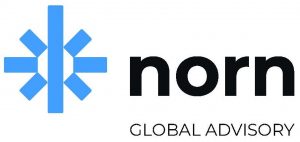Corporate
Corporate Use Cases
Many of the world’s largest corporations today rival the complexity of governments, as they transcend national borders in both supply chains and the delivery of goods and services. They also have the added requirement of profitability, unlike governments who face little risk of collapse even when services are at their poorest. This puts corporations under greater pressure for competitive advantage, in all forms that can take. Norn offers a long and growing list of such advantages, with sufficient breadth and potency that it is unlikely corporations absent them will remain competitive by any measure. This includes:
- Developing deep and broad in-house expertise through Norn systems, highly integrated and available on-demand.
- Updating knowledge of any or all domains every day, integrating the latest insights from emerging research to develop new insights.
- More responsive corporate processes, where data and analysis are prepared at superhuman speeds and scale, without delay.
- The ability to completely model and solve more complex problems than humans, with human-like understanding, while reducing bias.
- Producing higher quality and better-tailored products and services, more quickly and at lower costs than competitors.
Norn systems, for Teams and Divisions
In the corporate world many structures and team methodologies exist, all aimed at improving how efficient and effective the corporation is at each level of operations. At the team level, the tech industry adopted the “Two-pizza” team size policy in many companies, as larger teams proved less effective due to the number of connections between members. However, this approach can also create both taller hierarchies and more information silos, each of which poses distinct hazards to any business today, the consequences of which are often poorly understood if they’re even recognized at all.
Teams are the basic building blocks of corporations, as even the rarest individual talents require teams to support them in order to operate effectively. How effectively teams are built, operate, and optimized over time are matters we can greatly improve upon. Understanding each member of a team in-depth and seeing beyond human cognitive biases, as well as how best to optimize team dynamics around these details is something beyond the scope of human cognitive bandwidth, but scalable Norn systems can consider problems such as these with much greater ease while iteratively improving that understanding over time.
Even the most well-adjusted teams today that have taken shape absent that level of insight could stand to benefit measurably in terms of productivity and job satisfaction, as well as the long-term benefits of their efforts through better alignment with other teams and evolving global circumstances. Teams that operate at a more average level stand to benefit much more significantly from applying and iteratively refining this level of insight, helping to reduce employee friction, greatly reduce time spent on performance evaluations, and dynamically optimizing communication both within and between teams, among many other potential benefits.

Teams working with Norn systems also better preserve and distribute their expertise to their company as a whole, allowing executives to call upon that understanding without disturbing their work or prompting the stress of being queried by an authority figure. This availability of knowledge in a form where the sum of knowledge itself may answer questions as needed, potentially both 24/7 and globally, offers numerous advantages over relying on experts to either be available during limited windows of time or on-call when the timing is uncertain.
Even the best performing AGILE methodologies are more or less designed to work for the “average team”, even though the average team is a statistical illusion. In effect this just means that there is the least wrong with the approach, on average, making it a default option that requires minimal effort. Like all default options opportunities requiring more than that minimal effort tend to be ignored, and so teams often go through the motions even when the motions don’t make sense for them, they’re merely the wasteful norms of default expectation. This burdens individual teams and other teams they interact with and rely upon, while also serving to cultivate the malaise that has become pervasive in the tech industry, leading to reduced productivity and job satisfaction, as well as greater churn rates.

As Norn systems grow in their understanding, from individual employees up to the level of corporations as a whole, loosely knit groups of individuals bound by paychecks and expectations may instead come to operate as families and communities, learning and growing together towards their common purpose. As this divide between traditional companies and those using Norn systems becomes both more potent and more visible a clear question may emerge for employees everywhere, “Why would I choose anything else?”
Corporate e-Governance for Executives and Boards
Executives and Boards for large companies often invest considerable amounts of time and effort in keeping up-to-date with the activities and progress of their efforts, even when some of those tasks are delegated. However, even under the best of circumstances, they tend to get incomplete, delayed, and biased information as it travels through their various hierarchies. This poses 3 distinct types of value which Norn systems may greatly improve upon.
By having a company’s teams work with Norn systems the knowledge gained from their efforts is retained and understood, allowing it to be queried in whatever level of detail is required, even absent direct communication with that team. This allows the value to be delivered on-demand rather than through scheduled interactions or interruptions to a team’s workflow. Likewise, this also allows Norn systems to offer assessments with greatly reduced influence from the human cognitive biases most boards and executives have come to expect.
The success of companies often relies on the ability of the decision-makers to act and adapt more quickly and accurately than their competitors, which such advantages strongly facilitate. In addition, policy advice for the company as a whole may be offered based on the understanding each Norn system develops, of their company, their market, and of related global circumstances. Many major business decisions where the complexity is extremely high, such as potential acquisitions and mergers, could stand to benefit from this approach in even more significant ways than normal operations.


Companies using Norn systems at the highest level can also more easily and dynamically interact and explore opportunities with other companies and governments using Norn systems, discovering new methods of cooperation for their mutual benefit. As the number of such companies and governments using Norn systems grows so too does the potential for such opportunities, creating a substantial strategic advantage over traditional companies.
The level of detail in which a company understands the wants and needs of its clients is another matter where systems capable of more complete and quick analysis with substantially reduced cognitive bias can offer strategic advantages. Clients aren’t static, their wants and needs change over time, and mass-mailed surveys are a poor substitute for actual insight. Likewise, “customer success” professionals don’t often paint an unbiased picture of those they interact with, as their goals include making the customer “feel” success, even when it may not be present. In this way, clients stand to gain just as much from choosing Norn-assisted companies to work with as do the companies themselves. “Why pay for anything less?”

For further documentation go to our Documents Page. Additional materials are available by request.
